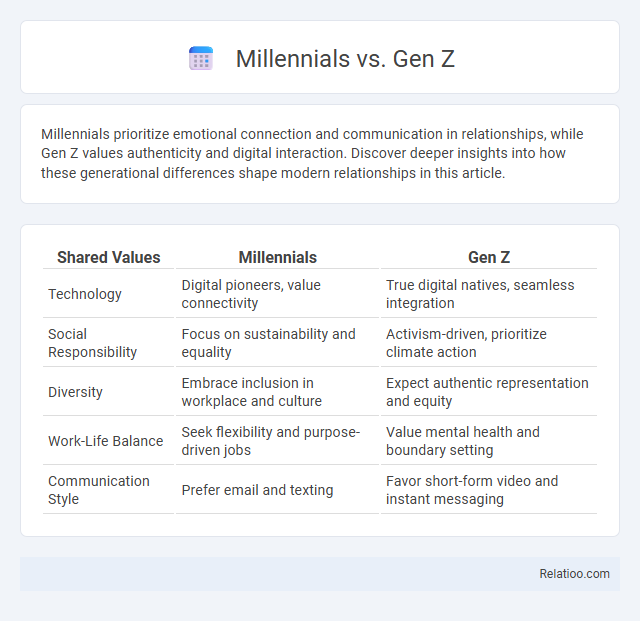Millennials prioritize emotional connection and communication in relationships, while Gen Z values authenticity and digital interaction. Discover deeper insights into how these generational differences shape modern relationships in this article.
Table of Comparison
| Shared Values | Millennials | Gen Z |
|---|---|---|
| Technology | Digital pioneers, value connectivity | True digital natives, seamless integration |
| Social Responsibility | Focus on sustainability and equality | Activism-driven, prioritize climate action |
| Diversity | Embrace inclusion in workplace and culture | Expect authentic representation and equity |
| Work-Life Balance | Seek flexibility and purpose-driven jobs | Value mental health and boundary setting |
| Communication Style | Prefer email and texting | Favor short-form video and instant messaging |
Defining Millennials and Gen Z
Millennials, born between 1981 and 1996, experienced the rise of the internet and social media during their formative years, shaping their digital fluency and consumer behaviors. Gen Z, typically defined as those born from 1997 to 2012, is the first generation to grow up with smartphones and constant internet connectivity, making them highly adept at multitasking and digital communication. Generational analysis highlights distinct cultural, economic, and technological influences that differentiate Millennials' emphasis on experiences from Gen Z's focus on authenticity and social responsibility.
Key Differences in Upbringing
Millennials, born between 1981 and 1996, experienced a predominantly analog childhood before transitioning into the digital era, whereas Gen Z, born from 1997 onward, are digital natives immersed in technology from birth. Unlike Millennials who often witnessed economic growth during their upbringing, Gen Z faced the aftermath of the 2008 financial crisis and the COVID-19 pandemic, shaping their views on stability and career. Parenting styles also differ, with Millennials raised under more structured, achievement-focused methods, while Gen Z tends to grow up in environments emphasizing mental health awareness and social consciousness.
Technology and Digital Natives
Millennials, born between 1981 and 1996, experienced the rise of the internet and mobile technology, becoming the first true digital natives with a strong affinity for social media and digital communication. Generation Z, born from 1997 onwards, grew up fully immersed in smartphones, high-speed internet, and social media platforms, exhibiting advanced digital fluency and a preference for video content and interactive technology. Generational differences in technology adoption highlight Millennials' role in early digital transformation, while Gen Z leads in seamless integration of emerging technologies like AI, VR, and blockchain into daily life.
Communication Styles and Social Media Usage
Millennials primarily engage with communication through emails and texts, favoring platforms like Facebook and Instagram for social media interaction, whereas Gen Z prefers instant messaging apps and short-form video content on TikTok and Snapchat. Generational differences highlight that Millennials value detailed and structured communication, while Gen Z seeks authenticity and brevity, impacting how Your brand tailors messages across channels. Understanding these distinct communication styles and social media usage patterns is essential for effective engagement in marketing and customer relations.
Education and Career Priorities
Millennials prioritize higher education as a pathway to career advancement, often valuing stability and traditional corporate roles, while Gen Z places greater emphasis on practical skills, digital literacy, and flexible work environments that align with their desire for work-life balance. Generational differences highlight that Millennials favor formal degrees and structured career progression, whereas Gen Z seeks continuous learning opportunities and entrepreneurial ventures. Understanding these distinct education and career priorities can help you tailor professional development and recruitment strategies effectively.
Attitudes Toward Money and Spending
Millennials prioritize experiences and value convenience, often balancing saving with spending on travel and technology, reflecting a pragmatic financial mindset shaped by economic uncertainty. Gen Z emphasizes financial independence and cautious spending, favoring budgeting tools and investing early, influenced by witnessing Millennials' economic struggles and debt challenges. Generational attitudes toward money reveal shifting priorities, with Millennials leaning toward lifestyle enrichment, Gen Z prioritizing security and financial literacy, and broader trends showing increasing digital payment adoption and preference for value-driven consumption.
Social and Political Values
Millennials prioritize social justice, environmental sustainability, and inclusivity, often advocating for progressive policies and systemic change. Gen Z emphasizes digital activism, mental health awareness, and intersectionality, pushing for more urgent reforms and transparent governance. Your understanding of generational differences in social and political values can enhance how you engage with diverse perspectives and policy discussions.
Mental Health and Wellbeing
Millennials experience mental health challenges influenced by economic instability and social media pressures, often prioritizing work-life balance and self-care routines. Gen Z demonstrates higher awareness and openness toward mental health, advocating for destigmatization and increased access to therapy and digital mental health resources. Generational differences reflect evolving attitudes, with Gen Z embracing holistic wellbeing, including mindfulness and community support, contrasting with Millennials' focus on individual resilience.
Workplace Expectations and Trends
Millennials prioritize meaningful work, flexibility, and professional development, often seeking clear career advancement and work-life balance. Gen Z emphasizes inclusivity, technological integration, and mental health support, valuing transparent communication and purposeful company missions. Understanding these generational workplace expectations helps you create a dynamic environment that fosters engagement, retention, and productivity.
Influence on Pop Culture and Consumer Behavior
Millennials and Gen Z significantly shape pop culture and consumer behavior through their unique values, digital fluency, and social consciousness. Millennials favor authenticity and experiences, driving trends in sustainable brands and online communities, while Gen Z's preference for fast, visual content and social activism fuels viral marketing and ethical consumerism. Your brand must adapt by embracing these generational nuances to effectively engage and influence their purchasing decisions.

Infographic: Millennials vs Gen Z
 relatioo.com
relatioo.com